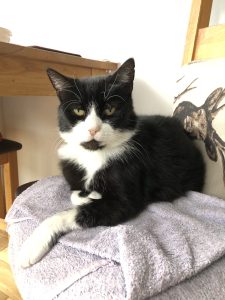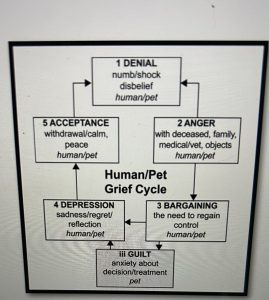Losing your animal is the hardest part of the relationship
As a pet owner, you know that the hardest part of having a pet isn't dealing with the mess, the torn furniture, or even the costly vet bills.
The real heartache comes from knowing that, one day, you will have to say goodbye.
If you’re fortunate, your pet will grow old, but eventually, their body will no longer be able to carry the vibrant, loving spirit that has been by your side for so long.

Anticipatory grief
Sometimes, the grief begins even before we lose them. Receiving a life-limiting diagnosis for your beloved pet can trigger anticipatory grief, as you start to process the reality of their loss before it happens. This can stir up a range of emotions—fear, sadness, anxiety—that may feel overwhelming and disrupt daily life as you watch and wait. You may find yourself feeling a growing sense of panic, wondering when it will happen, what it will be like, and how you’ll cope when the time comes.

Mika
I first came across Mika, a little stray, during a walk. She was so emaciated she could barely stand. Without hesitation, I scooped her up and took her home (I tried for weeks to find her owners but they were never found). What followed were months of vet visits, treatments, and near losses, but after some specialized care, Mika finally pulled through. Despite everything, she remained loving, vocal, and curious throughout, always by my side—even supervising 'us' as we hung out the washing, making sure it was done right! She brought so much joy and lived happily for four more years.
Then one day, I noticed an issue with her mouth, and after investigation, it turned out to be cancer. From that moment, I began experiencing anticipatory grief, torn between cherishing our remaining time together and being overwhelmed by the sadness of what was to come. I often found myself battling waves of anger, disbelief, and sadness all at once, emotions many of you will no doubt recognise. I felt anger that after all she had been through this had happened. It all felt so unfair.
As her condition worsened, guilt crept in, even though I knew in my heart I’d done everything I could. But love makes these moments so difficult, no matter how rational we try to be. I will always miss her, and there are still times I stop, I cry and I feel a mixture of emotions.
In my next blog I will be sharing some experiences of what I have found to have helped me to cope with the loss and the anticipatory loss of my own animals.

Why do we experience grief emotions?
- Your Pet is Part of Your Family
Although your pet is an animal, they are also a cherished member of your family. For many pet owners, the bond goes even deeper—your pet may feel like part of your identity or an extension of yourself. When a pet dies, it’s not just the loss of an animal; it’s the loss of a beloved companion and a part of you. Acknowledging the depth of this bond is essential to healing, and being with others who understand can bring comfort. - Losing a Source of Comfort
Your pet offers more than just companionship—they are a source of comfort and a way to relieve stress. When they’re gone, you may feel isolated, missing the one you’d turn to for support. Looking at photos or memories may be hard at first and bring tears, but allowing yourself to release those emotions can help. Over time, remembering them can provide comfort, and talking to others about your pet can ease your sense of loss. - Your Pet Was Part of Your Everyday Life
You probably spent more time with your pet than anyone else, and their absence disrupts your daily routine. This can leave you feeling lost or lacking purpose, especially if they were always by your side. - Unconditional Love
The bond you shared with your pet is rare and uncomplicated. Unlike human relationships, which can be fraught with insecurities and drama, your pet loved you without judgement. Though they couldn’t express it in words, you knew in your heart how much they cared for you.
The Stages of grief that you may experience:

William Sife, Human/Pet Grief Cycle
Grieving the loss of a beloved pet is a natural and important part of the healing process. You’ll likely feel their absence for the rest of your life, and while this can be difficult, it’s also a reflection of the deep bond you shared.
The pain of grief comes from the love you still have for your companion, love that no longer has an outlet. Missing them is a sign of how much they meant to you, and though the sadness can be hard to bear, it’s a testament to the special place they will always hold in your heart.
I offer bereavement support for you during this time of loss. Having support as you navigate your grief can help, a place to talk, to cry, and to find a way through the pain you may be feeling at the moment. I offer a space in which your grief will be heard and acknowledged without judgement.
7 October, 2024
#PetLoss #PetBereavement #CopingWithPetLoss #PetLossSupport #GrievingAPet #PetGriefCounseling #PetMemorial #PetGriefSupport #HealingAfterPetLoss #LosingAPet #PetLossCounseling #PetLossJourney #DealingWithPetLoss #PetGriefHelp #UnderstandingPetLoss #PetLossTherapy #PetLossAwareness #GriefAndLoss #AnimalCompanionLoss #PetLossHealing #SupportForPetLoss #HonoringYourPet #PetLossRecovery #PetLossCommunity #PetGriefAwareness #CopingWithLoss
